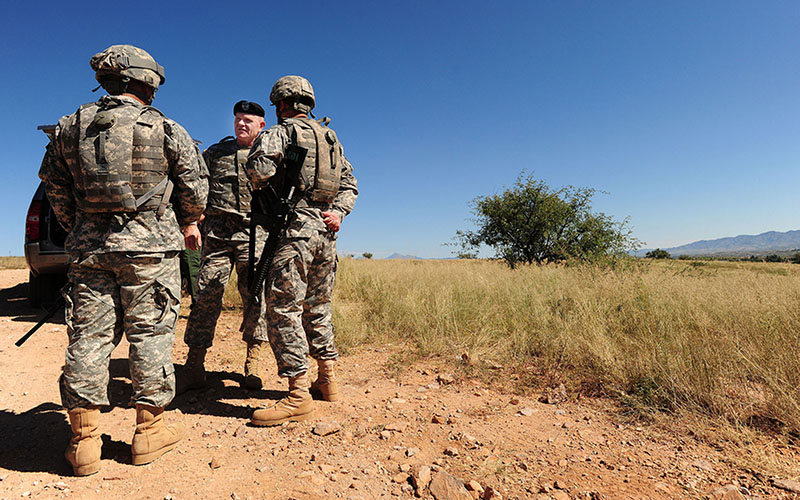
National Guard troops have been called on several times to help patrol the border, including this 2010 deployment in Arizona and again this year, but some question President Donald Trump’s latest call to use the military to close the border (U.S. Army photo by Sgt. 1st Class Jon Soucy)
WASHINGTON – Before heading to Arizona for a political rally Thursday, President Donald Trump threatened to “seal the southern border” with troops if that’s what it takes to stop the latest caravan of Central American migrants heading to the U.S.
Trump’s early Thursday tweets were met with skepticism in Washington, where reactions ranged from puzzled to problematic to profane.
Many experts said the military cannot be legally used to police the border, while advocates accused the president of making “grandiose political statements” instead of working with Congress on border issues.
“Once again, President Trump’s ignorance on one of his so-called ‘signature issues’ is astounding,” Rep. Raul Grijalva, D-Tucson, said in a written statement.
Trump’s tweets come as a caravan of thousands of Central American migrants are fleeing their own countries and heading north.
Trump threatened to cut off aid to Honduras, Guatemala and El Salvador if their governments do not stop the migration. He said that is more important to him than the recent trade deal with Mexico, which he said “in the strongest of terms” must “stop this onslaught.”
“If unable to do so I will call up the U.S. Military and CLOSE OUR SOUTHERN BORDER!” Trump tweeted.
The Pentagon, for its part, said only that it had not yet “been tasked to provide additional support” beyond the National Guard troops already at the border.
It’s not the first time the president’s tweets have gotten ahead of his policies, including tweets calling for a ban on transgender soldiers and a threat to close the government over border wall funding. It’s also not the first time the president has called for troops on the border.
In April, he authorized the deployment of thousands of National Guard troops to assist Border Patrol agents. But his tweet Tuesday appeared to be an expansion of that move.
Immigration experts in Washington doubted the legality of an expanded military role.
David Bier, an immigration policy analyst at the Cato Institute, said military personnel are legally not permitted to enforce immigration law, and that their duties at the border have been to “fix fences and vehicles.”
“They essentially serve a public relations purpose,” Bier said.
Bier said it’s possible President Trump could issue an executive order, similar to his earlier travel ban, to deny entry to those in the caravan. But David Inserra, a Heritage Foundation policy analyst, said the migrants in the caravan are different than the visa-seekers the travel ban affected.
“They’re not applying for visas, they’re crossing a border,” Inserra said. “There’s a whole bunch of laws here that intersect, we haven’t been down this road before.”
Elaine Kamarck of the Brookings Institution speculated that Trump made the threat with next month’s elections in mind, “to fire up the base.”
“That’s the only rational reason I can think he would do this,” said Kamarck, who pointed to the National Guard troops already on the border.
Matt Sussis, of the Center for Immigration Studies, which favors lower immigration, said that while threatening to cut off aid is a potent means of influencing other countries, the timing of the tweet is likely a strategic move.
“Trump himself tweeted that he thinks immigration is going to be an important issue to talk about ahead of the midterms, and polls indicate that immigration is the number one issue for voters right now,” said Sussis, assistant communications director for the center.
A spokesman for the Federation for American Immigration Reform, which also favors reduced immigration, called Trump’s proposals an appropriate response to the influx of migrants from Central America.
“When you have large-scale incursions of people into the United States organized, you have to use all the mechanisms available to prevent that from happening,” said Ira Mehlman, the spokesman.
“The vast majority of people are not coming because they want to cause any harm or mischief here,” Mehlman said, “but it does present an opportunity for those who do to kind of filter in with everybody else.”
But Abdel Nunez, executive director of the Central American Resource Center, called Trump’s latest proposals out of touch with the reality of illegal immigration and its causes.
“He’s completely ignorant of the issues,” Nunez said. “The only thing that he has sort of proposed is a wall.”
He said the U.S. has been “complicit in those conditions in the region” that are driving immigrants north, and should be focused on “long-term solutions, structural fixes, strengthening … democratic institutions,” rather than militarizing the border.
“Everything that he has done around immigration has been to get his wall funded, which has not happened,” Nunez said of Trump. “So he continues to do that and continues to denigrate immigrants, which continues this narrative that immigrants are a danger to the nation, which is a complete opposite to reality.”
In remarks to reporters Thursday, White House Press Secretary Sarah Sanders said the administration “is doing a great job on the border,” and blamed Democrats for the problems.
“We are furious at the failure of congressional Democrats to help us address this growing crisis,” Sanders said. “They should be ashamed for pushing an open borders agenda and are only doing this for strictly political reasons.”
But Grijalva laid the blame back on the administration.
“Deploying military to the border is costly, ineffective, and does nothing to strengthen border security,” he said. “It only further militarizes border communities and reinforces a false perception of insecurity and lawlessness.”